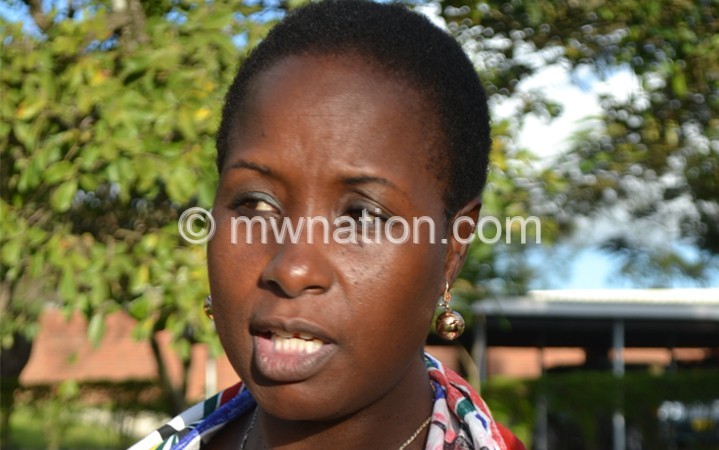‘Our parties are boys clubs’
In this article, our News Analyst MERCY MALIKWA explores how partisan politics trumps women’s rights and participation in politics.
There is a lot of talk about gender equality and women empowerment in the country.

Achieving equal representation of men and women in political and decision-making positions is a hot topic.
In the run up to the May 2014 Tripartite Elections, government, NGO-Gender Coordination Network and UN Women jointly staged a 50:50 campaign to increase the numbers of women in politics.
Female contenders for parliamentary seats paid just K75 000 where men paid K100 000 and those aspiring for councillorship paid K15 000 instead of K20 000.
Besides the subsidised nomination fees, the women vying for political positions received cash boosts and campaign material from the 50:50 backers.
However, the push stuttered to a remarkable slump as only 30 women made it to the country’s 193-seater Parliament, down from 43 in 2009.

boys’ clubs
Besides, only 53 women made it in the over 350 wards nationwide
Parties were blamed of not adequately supporting the push for gender parity.
With just two years to the next polls, the agenda for gender equality in politics is gaining sway.
Gradually, activists are re-emerging from boardrooms where a post-mortem of the May 2014 tragedy point to the need to re-strategise and amplify the value women add to politics.
What factors stopped women from assuming the positions up for grabs three years ago?
As the inquest continues, gender and legal activist NgeyiKanyongolo says there is not much difference in performance of men and women in elected positions.
“There is no difference,” says Kanyongolo, explaining: “There are good and bad leaders, both male and female. A leader does not perform badly simply because she is a woman. The problem, however, is that there aren’t many women who are holding political and decision-making positions.”
The fewness of women holding positions of power means that the failure of one negates the highs of the rest, she said.
“When women are put in positions, they perform well. What is needed is just critical numbers for a difference to be seen,” she explains.
Kanyongolo, who has done extensive research in the phenomenon, commends the enactment of Gender Equality Act in 2013 which outlaws a member of one sex from occupying more than 60 percent of seats when it comes to jobs, training opportunities and other spheres of public life.
She sees the 60:40 quota in tertiary education and public service appointments increasing the number of women.
“Some efforts have immediate results whereas others are gradual. Increasing the number of girls attaining education and change of the marriage age from 16 to 18 may not produce immediate results, but there will be a time these will be cited as reasons for fair representation of women and men in key positions,” says Kanyongolo.
Political scientist Mustapha Hussein says there are women who have demonstrated effective leadership and have added value when entrusted with positions.
“Some women, who have been given an opportunity, have played an effective leadership role. When the late Joana Ntaja was the mayor of Zomba City Council, the perception was that she was doing very well. She commanded respect among fellow councillors and provided effective leadership in the council,” he said.
The political analyst, based at Chancellor College in the city, also singled out Lillian Patel of United Democratic Front (UDF), Jean Kalilani in Democratic Progressive Party (DPP) and Juliana Lunguzi in Malawi Congress Party (MCP) as some women who have demonstrated effective leadership when entrusted with prominent positions.
While some Malawians expect women in leadership positions to champion the women-related causes, there is scanty evidence if this has been successful because developing pro-women laws and policies is a collective decision that does not exclude men.
Despite this, it is important for women to occupy decision-making positions because democracy is nothing without the involvement of the muted majority.
Male dominance is one of the factors holding back women from assuming decision-making positions.
In the patriarchal societies, men tend to favour fellow men.
This was pronounced in 2011 when then DPP regional governor Noel Masangwi publicly proclaimed that Malawi was not ready for a female president.
This might have been a scathing attack on Joyce Banda, who rose to the presidency when Binguwa Mutharika dropped dead in April 2012, but it reinforces the stereotype among some men that women were not made to lead them.
But the women themselves could be doing themselves a disservice, warns Hussein.
“If she does not demonstrate leadership qualities, fails to be assertive, lacks lobbying skills, these factors can also contribute to her failure to assume the desired positions,” he explains.
Women Parliamentary Caucus chairperson Jessie Kabwila says political parties are to blame for women’s failure to assume political and decision-making positions.
She describes political parties in the country as mainly “boys clubs”.
“Our parties are very patriarchal,” says Kabwila. “Look at the structures, where the women leagues are. They are actually structured not to take them to presidency. The women leagues are taken as the kitchens of the parties. It is where women are expected to cook, feed people, dance and shut up.”
She calls for transformation of party structures to give men and women equal rights and chances in the race to the top.
Kabwila also urges party executives to adopt an affirmative action not only to even up the gender gap, but also to ensure women are actively taking and retaining positions of power.
“If a president is a man, the vice must be a woman. They must adopt a zebra-listing; there is no shortcut to that,” she says.
Kabwila reckons the country must guard against producing fewer MPs and councillors in 2019, saying this will contravene the 40:60 ration stipulated in the Gender Equality Act.
Also to blame are the values propagated by traditional and religious leaders who hold that women are born to be submissive to men.
“Besides, politics is expensive. If a likeable woman does not have money to do politics, she cannot win. This is why the country needs to put laws to regulate political party financing.”





